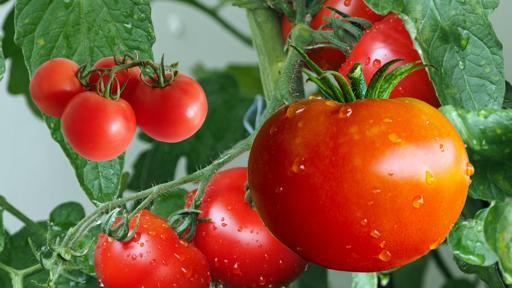Tomato
Solanum lycopersicum
Also known as: Tomato, Love Apple

Growing Information
Growth Habit: Annual
Climate Requirements: Tomatoes require a warm climate with temperatures between 20-25°C (68-77°F). They need full sun and well-drained soil.
Soil Requirements: Tomatoes prefer slightly acidic soil with a pH of 6.0 to 6.8. The soil should be rich in organic matter.
Water Requirements: Tomatoes need consistent watering, about 1-2 inches per week. Avoid overhead watering to prevent disease.
Planting Instructions: Plant tomatoes after the last frost date. Space plants 18-24 inches apart in rows 36-48 inches apart.
Harvesting Information: Tomatoes are ready to harvest when they are fully colored and slightly soft to the touch. Harvest regularly to encourage more fruit production.
Characteristics & Benefits
Plant Characteristics: Tomato plants typically grow to 1–3 meters in height. They are vines that have a weak stem that sprawls and typically needs support.
Nutrient Content: Tomatoes are rich in vitamins A and C, potassium, and antioxidants like lycopene.
Health Benefits: Tomatoes can help reduce the risk of heart disease and cancer. They are also good for skin health and vision.
Yield Information: Average yield is about 10-15 pounds per plant.
Uses & Distribution
Culinary Uses: Tomatoes are used in salads, sauces, soups, and as a base for many dishes.
Industrial Uses: Tomatoes are used in the production of ketchup, tomato paste, and canned tomatoes.
Native Range: Native to western South America.
Current Distribution: Widely cultivated around the world.
Pest & Disease Management
Common Pests: Aphids, whiteflies, and tomato hornworms are common pests.
Diseases: Common diseases include blight, fusarium wilt, and mosaic virus.
IPM Practices: Use crop rotation, resistant varieties, and proper spacing to manage pests and diseases. Handpick pests and use organic sprays if necessary.
Market Value: $1.50
Research & References
Studies and Articles: Studies show that tomatoes are beneficial for heart health and cancer prevention.
Bibliography: Smith, J. (2020). The Tomato Handbook. Garden Publishing.
Comments
Add CommentNo comments yet. Be the first to comment!